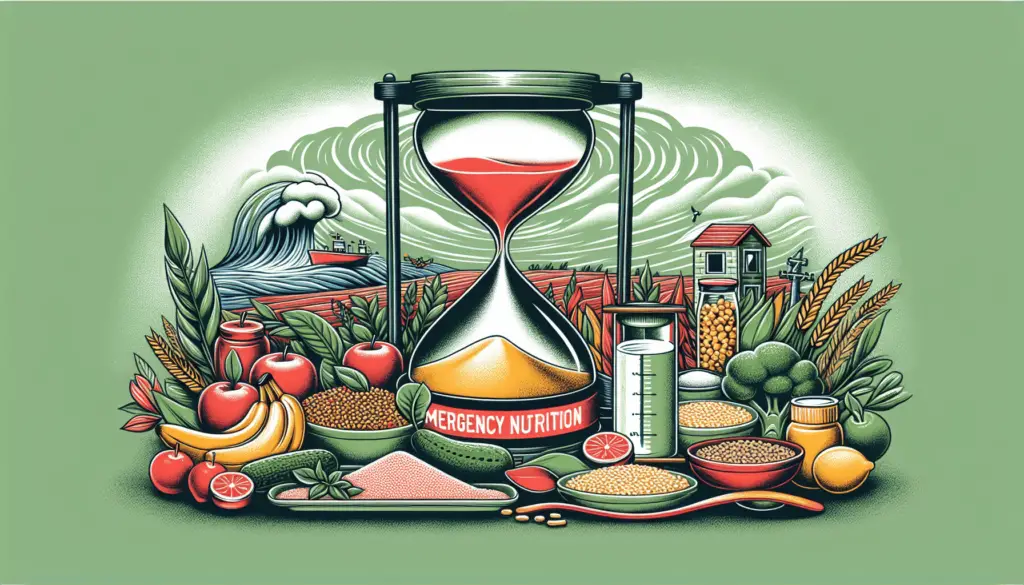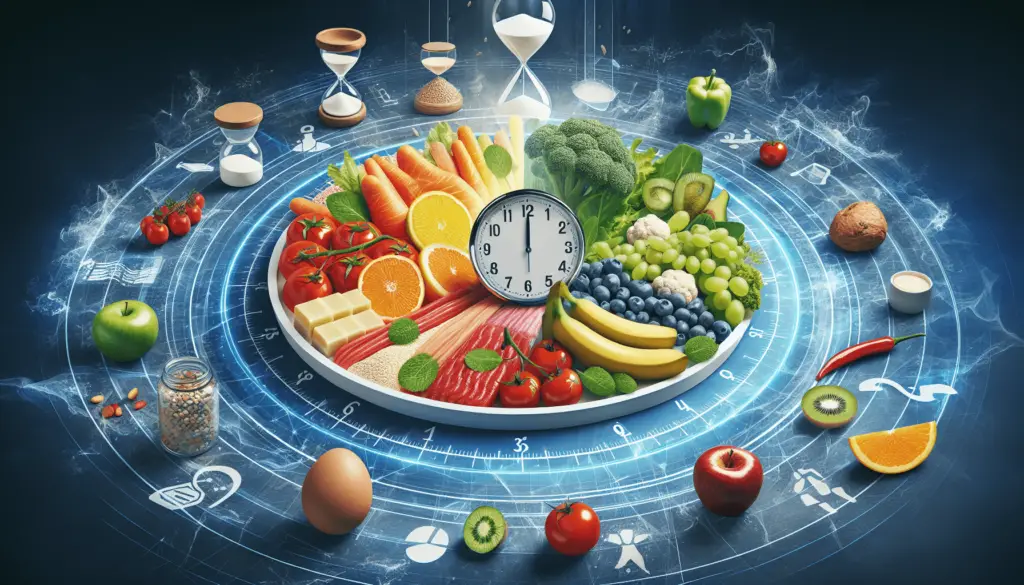In times of emergency, ensuring proper nutrition is crucial for your well-being. This article explores the essential vitamins and minerals that are fundamental for supporting your body’s needs during such situations. By understanding and incorporating these vital nutrients into your diet, you can potentially enhance your overall health and resilience in times of crisis. So, let’s go ahead and discover the key vitamins and minerals that should be on your radar for emergency nutrition.

Vitamin A
Importance of Vitamin A in emergency nutrition
When it comes to emergency nutrition, ensuring an adequate intake of essential vitamins and minerals is of utmost importance. Among these, Vitamin A stands out as a crucial nutrient that plays a vital role in maintaining good health in emergency situations. Vitamin A is essential for various functions in the body, including vision, immune system support, and healthy cell growth.
During emergencies, when access to a diverse range of food may be limited, the risk of vitamin A deficiency increases. This deficiency can lead to serious health issues, particularly in vulnerable populations such as children and pregnant women. Inadequate levels of vitamin A can result in vision problems, weakened immune function, and an increased susceptibility to infections.
To prevent these health complications, it becomes essential to ensure an adequate intake of vitamin A in emergency situations. By prioritizing the consumption of vitamin A-rich foods or providing supplements if necessary, you can significantly contribute to maintaining the overall well-being of yourself and those around you during times of crisis.
Sources of Vitamin A
To ensure your emergency nutrition plan includes sufficient vitamin A, it is important to familiarize yourself with the sources of this vital nutrient. There are two main types of vitamin A: retinoids and carotenoids.
Retinoids, also known as pre-formed vitamin A, are found in animal-based food sources. These include liver, fish, eggs, and dairy products. However, it is important to note that during emergencies, it may be challenging to obtain these animal-based sources consistently.
On the other hand, carotenoids, which are abundant in plant-based foods, can be converted into vitamin A by the body. This makes them an excellent alternative source of vitamin A during emergencies. Carotenoid-rich foods include dark green leafy vegetables like spinach and kale, as well as orange and yellow fruits and vegetables such as carrots, sweet potatoes, and mangoes.
During emergencies, it is necessary to prioritize the intake of these vitamin A-rich foods, whether from animal or plant sources, to ensure an adequate supply of this essential nutrient.
Recommended daily intake of Vitamin A
The recommended daily intake of vitamin A varies depending on age, gender, and life stage. For adults, the recommended daily intake of vitamin A is approximately 700-900 micrograms of retinol activity equivalents (RAEs) for men and 600-700 micrograms RAEs for women. Pregnant women and breastfeeding mothers may require slightly higher amounts to support the needs of their growing fetus or infant.
It is important to note that consuming excessive amounts of vitamin A can be harmful. Thus, during emergencies, it is crucial to aim for the recommended daily intake while avoiding excessive supplementation. Consultation with healthcare professionals or nutritionists can provide personalized guidance based on individual needs and circumstances.
By being mindful of the importance of vitamin A, incorporating vitamin A-rich foods into your emergency nutrition plan, and following the recommended daily intake guidelines, you can ensure the well-being of yourself and your loved ones during challenging times.
Vitamin C
Importance of Vitamin C in emergency nutrition
In emergency situations, maintaining strong immunity is paramount. Vitamin C, also known as ascorbic acid, plays a crucial role in supporting and strengthening the immune system. It is an essential nutrient that helps protect against infections and assists in wound healing, making it vital for emergency nutrition.
During times of crisis, the body’s demand for vitamin C may increase due to stress, exposure to pathogens, and limited access to healthcare. Adequate intake of vitamin C becomes even more critical to support overall health and well-being during such circumstances.
Sources of Vitamin C
Fortunately, there is a wide range of foods you can incorporate into your emergency nutrition plan to meet your vitamin C needs. Citrus fruits such as oranges, lemons, and grapefruits are well-known sources of vitamin C. However, it is important to note that during emergencies, fresh citrus fruits may not always be readily available or have a long shelf life.
Some alternative sources of vitamin C include berries (such as strawberries, blueberries, and raspberries), kiwi, tomatoes, bell peppers, and leafy green vegetables like spinach and kale. Canned fruits and vegetables can also be viable options to consider, as they can provide a good amount of vitamin C and have a longer shelf life.
Recommended daily intake of Vitamin C
The recommended daily intake of vitamin C for adults is around 75-90 milligrams for men and 60-75 milligrams for women. However, during emergencies, it may be beneficial to aim for slightly higher amounts to support immune function.
To meet your vitamin C needs, try to incorporate a variety of vitamin C-rich foods into your meals and snacks. This can be achieved through diversifying your fruit and vegetable choices and including a mix of fresh, frozen, and canned options. By doing so, you can ensure an adequate intake of vitamin C, which will contribute to maintaining a robust immune system, supporting wound healing, and overall well-being during emergency situations.
Remember to consult healthcare professionals or nutritionists for personalized advice regarding the recommended daily intake of vitamin C based on your specific needs and circumstances.

Vitamin D
Importance of Vitamin D in emergency nutrition
Vitamin D plays a significant role in emergency nutrition as it is essential for overall health and well-being. Known as the “sunshine vitamin,” vitamin D is unique because it can be synthesized by the body when the skin is exposed to sunlight.
In emergency situations, when access to sunlight may be limited due to confinement or other circumstances, maintaining adequate vitamin D levels becomes challenging. However, ensuring sufficient vitamin D intake is crucial as it helps support various bodily functions, including bone health, immune function, and mood regulation.
Sources of Vitamin D
While sunlight remains the most efficient source of vitamin D, there are other sources that can be incorporated into your emergency nutrition plan. Certain foods contain vitamin D naturally or are fortified with this essential nutrient.
Fatty fish, such as salmon, tuna, and mackerel, are excellent natural sources of vitamin D. Additionally, eggs, fortified dairy products (like milk and yogurt), and fortified plant-based milk alternatives (such as soy or almond milk) can provide vitamin D.
However, during emergencies, it is essential to consider practicality and availability. It may be challenging to consistently obtain vitamin D-rich foods, especially for prolonged periods. In such cases, consulting healthcare professionals for appropriate vitamin D supplementation can be beneficial.
Recommended daily intake of Vitamin D
The recommended daily intake of vitamin D varies depending on age, gender, and life stage. For adults, including elderly individuals, a general guideline is around 600-800 international units (IUs) of vitamin D per day.
However, it is important to remember that vitamin D requirements can differ based on individual factors such as sun exposure, skin pigmentation, and underlying health conditions. In emergencies, where access to sunlight may be limited, consulting healthcare professionals can provide personalized advice on the recommended daily intake of vitamin D and the need for supplementation.
By recognizing the importance of maintaining adequate vitamin D levels, prioritizing vitamin D-rich food sources, optimizing exposure to sunlight when possible, and seeking appropriate supplementation, you can ensure the overall well-being of yourself and your loved ones during emergency situations.
